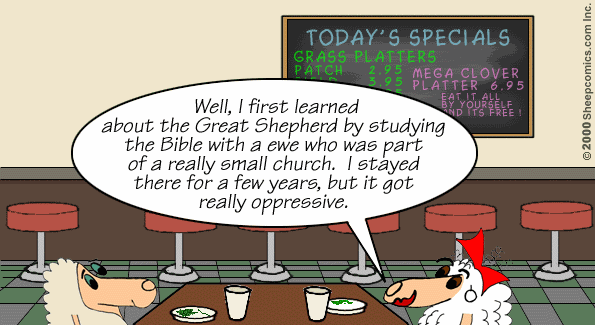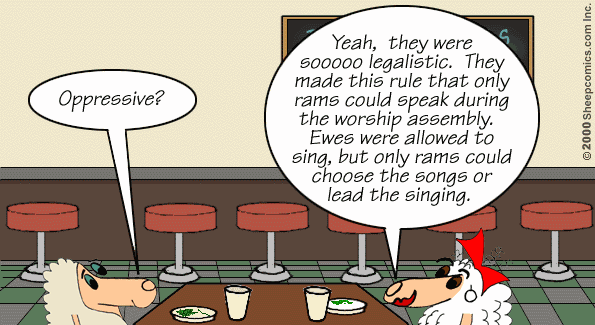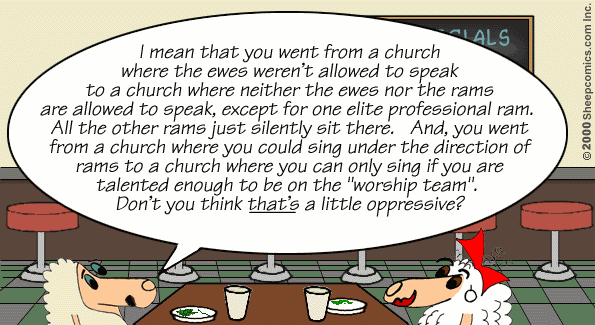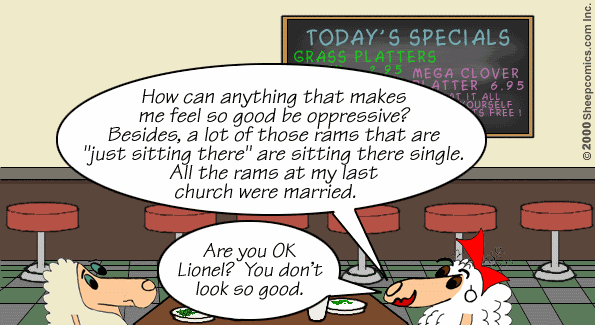










Editorial Notes
Have you ever found yourself wishing that one or more passages of scripture had never been written? I have. If I could go back in time and visit the Apostle Paul, I might try to talk him out of writing the passage below, or at least into wording it differently so I would have an easier time as we begin the 21st century in America.
"As in all the congregations of the saints, women should remain silent in the churches. They are not allowed to speak, but must be in submission, as the Law says. If they want to inquire about something, they should ask their own husbands at home; for it is disgraceful for a woman to speak in the church." (1 Corinthians 14: 33 Ė 35 NIV)
The "womenísí roll in the church issue" is a real "hot potato", and contrary to what you may have assumed, Iím not about to start tossing around this strife inducing spud. For now, Iíll settle for a bad word-play.
Now, Iíll confess that I donít have quite the emotional energy around this issue because I am a male. Whatever Paul was saying in this passage doesnít put any restriction on me. I can still speak in church, right?
Wrong! The irony of this whole "women role" issue is that many church systems not only interpret this passage as restrictively as possible for women, but they apply it to men too! There seems to be an unwritten "scripture" that goes something like this:
"As in all the corporate dynamic churches that are really growing, members who are not on payroll must remain silent. They are not allowed to speak, but must be in submission because thatís the way things are. If they want to inquire about something, they should keep it to themselves, for it is disgraceful for non-professionals to speak in church (and the senior pastor doesnít have time for this kind of thing anyway)."
The real power division in much of todayís church, in my opinion, is not between what men and women are allowed to do but between what only "professional Christians" get paid to do and what everyone else is not allowed to do. The professional church management system had reduced the vast majority of men to much the same kind of submission as Paul enjoined on the women in Corinth.
When Paul wrote that women were to keep "silent" in the churches (whatever exactly that meant), it seems implicit to me that men were allowed to speak. If women were to ask their husbands questions at home, did that mean that husbands were allowed to ask questions during the assembly? Is a system where half the attendees are allowed to ask questions, and the half are determined by gender, worse than a system where no one is allowed to ask questions and one individual controls all that people hear?
Freedom is a funny thing. It occurred to me that the very existence of freedom can lead to feelings of oppression. For example, if I am part of a population where everyone except me has the freedom to do something, I may feel very oppressed. Now letís suppose that half of a certain population has the freedom to do something and half does not. If I am part of the half-population that is denied this freedom, Iím going to feel oppressed. What makes it worse is if the half-population with the freedom seemed to do nothing to deserve it. Did any of us deserve to be born male or female? No, it just happened. We are what we are, and we didnít choose it.
Now, suppose I am part of a population where only one individual is allowed to do certain things, and that individual is not me. Will I feel oppressed? It depends on the situation. If the individual did something to earn this freedom, or is gifted in a remarkable way, I probably wonít have a problem with this person being allowed to do things that Iím not allowed to do.
But what if I am a member of a population where everyone says they are following a certain book, and that book says I have the freedom to do something, but the day-to-day reality is that I actually donít. That is when I start asking questions.
Consider what Paul wrote in 1 Corinthians 14:26 (just a few words before 1 Corinthians 14: 33 Ė 35):
"What then shall we say, brothers? When you come together, everyone has a hymn, or a word of instruction, a revelation, a tongue or an interpretation. All of these must be done for the strengthening of the church." (1 Corinthians 14:26 NIV)
I donít know much about "tongues" or "revelations", but I canít help noticing how different this is from the way we "do church" today. Where is the "worship team" performing here? Where is the full time professional figurehead who delivers a monologue surrounded by ritual so that no one can ask questions? Why is one passage in Corinthians 14 so often used to keep women silent, but the other almost never used to encourage a broad participation by everyone (or at least the men) in the assembly?
I donít want to give away the whole cartoon, so Iíll stop here. Just one more thing, and this for the ladies. The next time you find yourself feeling oppressed, try to think about us male "amateur Christians". We donít have it much better than you.
Web Shepherd